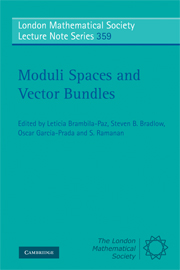Book contents
- Frontmatter
- Contents
- Preface
- Acknowledgments
- Part I Lecture Notes
- Part II Survey Articles
- Part III Research Articles
- 13 Beilinson Type Spectral Sequences on Scrolls
- 14 Coherent Systems on a Nodal Curve
- 15 Brill-Noether Bundles and Coherent Systems on Special Curves
- 16 Higgs Bundles in the Vector Representation
17 - Moduli Spaces of Torsion Free Sheaves on Nodal Curves and Generalisations – I
Published online by Cambridge University Press: 07 September 2011
- Frontmatter
- Contents
- Preface
- Acknowledgments
- Part I Lecture Notes
- Part II Survey Articles
- Part III Research Articles
- 13 Beilinson Type Spectral Sequences on Scrolls
- 14 Coherent Systems on a Nodal Curve
- 15 Brill-Noether Bundles and Coherent Systems on Special Curves
- 16 Higgs Bundles in the Vector Representation
Summary
The contents of this paper are essentially the same as in the unpublished note [13], but for some more comments on ramified H-bundles, H a semisimple algebraic group. The work of Ivan Kausz [4] is closely related to [13].
Introduction
Let X be an irreducible projective curve whose only singularities are nodes, say only one at x0 ∈ X. We take the base field as the field ℂ of complex numbers. The moduli spaces of (semi-stable) torsion free sheaves on X provide a good generalisation of the moduli spaces of vector bundles on smooth projective curves. They provide compactifications of the moduli spaces of (semi-stable) vector bundles on X and have good specialisation properties i.e. when a smooth projective curve specialises to X, these objects specialise well. An interesting question is to generalise the moduli spaces of torsion free sheaves in the context of reductive or semi-simple algebraic groups H i.e. to have moduli spaces on X which are compactifications of the moduli spaces of semi-stable principal H-bundles (in the sense of A. Ramanathan [8]). There is some progress now due to the works of A. Schmitt and Usha Bhosle ([2],[11]).
Information
- Type
- Chapter
- Information
- Moduli Spaces and Vector Bundles , pp. 484 - 505Publisher: Cambridge University PressPrint publication year: 2009
Accessibility standard: Unknown
Why this information is here
This section outlines the accessibility features of this content - including support for screen readers, full keyboard navigation and high-contrast display options. This may not be relevant for you.Accessibility Information
- 1
- Cited by
